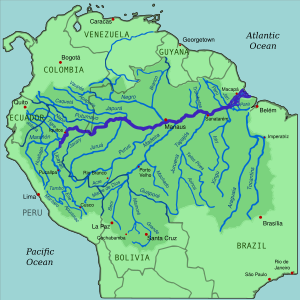Amazon River
| Amazon River (Amazonia) | |
| Apurímac, Ene, Tambo, Ucayali, Amazonas, Solimões | |
| River | |
| Countries | Peru, Colombia, Brazil, Ecuador |
|---|---|
| Tributaries | |
| - left | Marañón, Japurá/Caquetá, Rio Negro/Guainía, Putumayo |
| - right | Ucayali, Purús, Madeira, Tapajós, Xingu |
| City | Iquitos (Peru); Leticia (Colombia); Tabatinga (Brazil); Tefé (Brazil); Itacoatiara (Brazil) Parintins (Brazil); Óbidos (Brazil); Santarém (Brazil); Almeirim (Brazil); Macapá (Brazil); Manaus (Brazil) |
| Source | Rio Mantaro |
| - location | Huancayo, Huancayo Province, Peru |
| - elevation | 5,220 m (17,126 ft) |
| - coordinates | 10°43′55″S 76°38′52″W / 10.73194°S 76.64778°W |
| Mouth | Atlantic Ocean |
| - elevation | 0 m (0 ft) |
| - coordinates | 0°42′28″N 50°5′22″W / 0.70778°N 50.08944°WCoordinates: 0°42′28″N 50°5′22″W / 0.70778°N 50.08944°W |
| Length | 6,992 km (4,345 mi) |
| Basin | 7,050,000 km2 (2,722,000 sq mi) |
| Discharge | |
| - average | 209,000 m3/s (7,381,000 cu ft/s) |
The Amazon River (US /ˈæməzɒn/ or UK /ˈæməzən/; Spanish and Portuguese: ) in South America is the largest river by discharge of water in the world, and according to some experts, the longest in length.
The headwaters of the Apurímac River on Nevado Mismi had been considered for nearly a century as the Amazon’s most distant source, until a 2014 study found it to be the Cordillera Rumi Cruz at the headwaters of the Mantaro River in Peru. The Mantaro and Apurímac confluence, and with other tributaries form the Ucayali River, which in turn confluences with the Marañón River upstream of Iquitos, Peru, to form what countries other than Brazil consider to be the main stem of the Amazon. Brazilians call this section the Solimões River above its confluence with the Rio Negro to form what Brazilians call the Amazon at the Meeting of Waters (Portuguese: Encontro das Águas) at Manaus, the river's largest city.
...
Wikipedia


